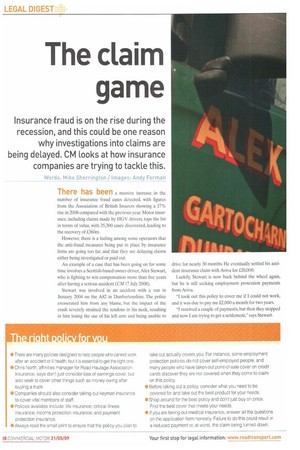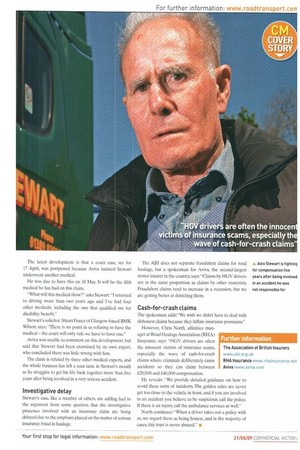The claim game
Page 28

Page 29

If you've noticed an error in this article please click here to report it so we can fix it.
Insurance fraud is on the rise during the recession, and this could be one reason why investigations into claims are being delayed. CM looks at how insurance companies are trying to tackle this.
Words: Mike Sherrington / Images: Andy Forman There has been a massive increase in the number of insurance fraud cases detected, with figures from the Association of British Insurers showing a 17% rise in 2008 compared with the previous year. Motor insurance, including claims made by HG V drivers, tops the list in terms of value, with 35,300 cases discovered, leading to the recovery of 1360m.
However, there is a feeling among some operators that the anti-fraud measures being put in place by insurance firms are going too far, and that they are delaying claims either being investigated or paid out.
An example of a case that has been going on for some time involves a Scottish-based owner-driver, Alex Stewart, who is fighting to win compensation more than five years after having a serious accident (CM 17 July 2008).
Stewart was involved in an accident with a van in January 2004 on the A82 in Dunbartonshire. The police exonerated him from any blame, hut the impact of the crash severely strained the tendons in his neck, resulting in him losing the use of his left arm and being unable to drive for nearly 30 months. He eventually settled his accident insurance claim with Aviva for £20,000.
Luckily, Stewart is now back behind the wheel again, but he is still seeking employment protection payments from Aviva.
"I took out this policy to cover me if I could not work, and it was due to pay me £2,000 a month for two years. received a couple of payments, but then they stopped and now I am trying to get a settlement," says Stewart. The latest development is that a court case, set for 17 April, was postponed because Aviva insisted Stewart underwent another medical.
He was due to have this on 18 May. It will be the fifth medical he has had on this claim.
"What will this medical show?" asks Stewart. "I returned to driving more than two years ago and I've had four other medicals, including the one that qualified me for disability benefit" Stewart's solicitor, Stuart Fraser of Glasgow-based BMK Wilson, says: "There is no point in us refusing to have the medical — the court will only rule we have to have one."
Aviva was unable to comment on this development, but said that Stewart had been examined by its own expert, who concluded there was little wrong with him.
The claim is refuted by three other medical experts, and the whole business has left a sour taste in Stewart's mouth as he struggles to get his life back together more than five years after being involved in a very serious accident.
Investigative delay
Stewart's case, like a number of others, are adding fuel to the argument from some quarters that the investigative processes involved with an insurance claim are being delayed due to the emphasis placed on the matter of serious insurance fraud in haulage. The ABI does not separate fraudulent claims for road haulage, but a spokesman for Aviva, the second-largest motor insurer in the country, says: "Claims by HGV drivers are in the same proportion as claims by other motorists. Fraudulent claims tend to increase in a recession, but we are getting better at detecting them.
Cash-for-crash claims the spokesman adds:-We wish we didn't have to deal with dishonest claims because they inflate insurance premiums" However, Chris North, affinities manager at Road Haulage Association (RHA) Insurance, says: "HGV drivers are often the innocent victims of insurance scams, especially the wave of cash-for-crash claims where criminals deliberately cause accidents so they can claim between £20,000 and £40,000 compensation.
He reveals: "We provide detailed guidance on how to avoid these sorts of incidents. The golden rules are never get too close to the vehicle in front, and if you are involved in an accident you believe to he suspicious, call the police. If there is an injury, call the ambulance services as well."
North continues: "When a driver takes out a policy with us, we regard them as being honest, and in the majority of cases, this trust is never abused." •
Further inform
















































































































































